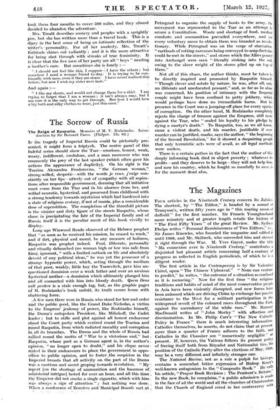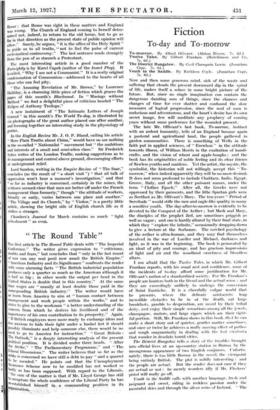The Magazines Fotrit articles in the Nineteenth Century concern its
Jubilee. The shortest, by "The Editor," is headed by a sonnet of Tennyson's, written fifty years. ago in "this roaring moon of daffodil " for the first number. Sir Francis Younghusband more minutely and at greater length retails the history of "The First Fifty Years" of the great Review. Mr. Sydney Phelps writes 'Personal Reminiscences of Two Editors," i.e., Sir James Knowles, who founded the magazine and edited it until 1908, and Mr. Skilbeck, who succeeded him and steered it right through the War. M. Yves Guyot, under the title "Ma connexion avec la Nineteenth Century," contributes a disjointed but pleasant article concerning half a century of progress as reflected in English periodicals, of which he is a diligent reader.
The first article in the Contenzporary is by Sir Valentine Chirol, upon "The Chinese Upheaval." "None can venture to predict," he writes, "the outcome of a situation as confused as it is menacing." Now for the first time "the religious traditions and habits of mind of the most conservative people in Asia -have been violently disrupted, and new forces have been unloosed which are driving China tp exchange her passive resistance to the West for a militant participation in the widespread revolt. of the coloured races throughout. the East, against the' ascendancy of the white race." -Mr. Ramsay MacDonald writes of "John Morley" with affection and discrimination, In Mr. Philip - Carr's ' "The New Catholic Policy in France" there is much interesting information. Catholics themselves, he asserts, do not claim that -at: present ;nore than a quarter of France adheres to the faith, and Catholics in the, Chamber are "numerically, negligible at present. If, however, the Vatican follows its present .polleY of freeing itself both-from Royalist and Nationalist -ties, the position of the Catholic party after the elections of May,
1928, may be a very different-and infinitely stronger-one. •
The National, Review, not -as a -rule a Pulpit for bishop!, contains a somewhat: bitter, eApression :of -Bishop. Knox well-known antagonism to the" Composite Book." He call!, is article, "Prayer Book Revision : The Penitent's Return In the new Book, he complains, a public admission is made in the face of all the world-and all the churches of Christendr: that the Church of England erred -in her .controversy Home; that Rome was right in these matters and England was wrong. The Church of England coming to herself deter- mined not, indeed, .to return to the old hone, but to go as far in that direction as the present state of public_opinion will allow." Surely, he argues, "it is the office of the Holy Spirit" to guide us to all truths, "not to feel the pulse of current ecclesiastical controversy." The last sentence reads strangely from the pen of so staunch a Protestant.
The most interesting article in a good number of the Fortnightly is by Karel Capek (author of the Insect Play). It is called, "Why I am not a Communist." It is a really Original condemnation of Communism—addressed to the hearts of all those who can feel pity.
"The Amazing Revelation of Mr. Brown," by Laurence Halliday, is a charming little piece of fiction which graces the pages of this month's Blackwood. In "Musings without Method " we find a delightful piece of criticism headed "The Eclipse of Anthony Trollope."
A new instalment of "The Intimate Letters of Joseph Conrad" in this month's The World To-day, is illustrated by six photographs of the great author placed one after another, and forming together an interesting study in the physiology of genius.
In the English Review Mr. J. 0. P. Bland, calling his article "More Plain Truths about China," would have us see nothing in the so-called " Nationalist " movement but " the ambitions and interests of a small and semi-alien class." Sir Frederick Sykes writes of the London Traffic, making suggestions as to its management and control above ground, discouraging efforts at underground relief.
Lord Sandon, writing in the Empire Review of "The Saar," concludes (as the result of " a short visit ") "that all talk of oppression won't bear a moment's investigation," and that "so far as industry is concerned, certainly in the mines, the evidence seemed clear that men are better off under the French management than formerly," though" the attitude of workers, friendly or surly, varies between one place and another."
The Village and its Church," by "Visitor," is a pretty little article, showing the bright side of English church life as it strikes a stranger.
Chambers's Journal for March contains as much "light refreshment" as ever.































































 Previous page
Previous page